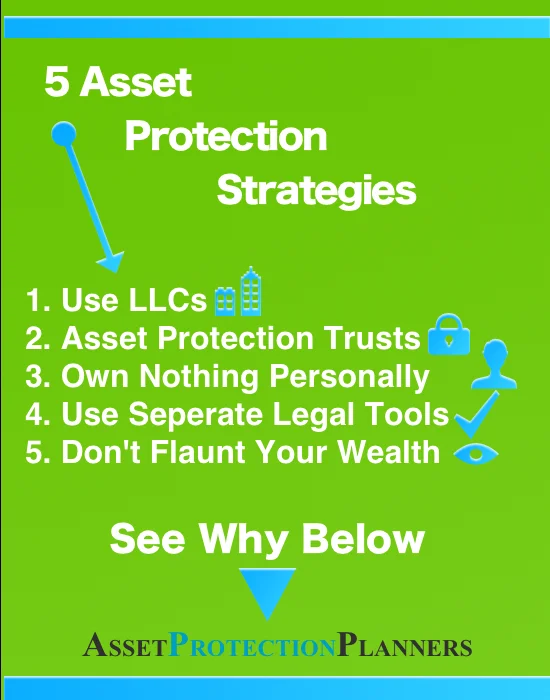The best asset protection strategies involve legal tools and financial plans developed to shield valuables from lawsuits. This includes analyzing a list of assets that need protection and determining which legal instrument or strategy would ideally protect each one.
Examples include forming certain types of trusts and companies and taking advantage of regional laws designed to protect assets. It can aid in achieving financial goals, estate planning for the next generation, as well as facing the reality that we are all vulnerable to litigation. Though pre-planning is best, there are even ways to protect yourself after a lawsuit is filed.

Five Best Asset Protection Strategies
Here is a list of five common legal strategies for shielding assets from lawsuits.
- Use LLCs
Asset protection strategy number one is to use limited liability companies. LLC statutes include provisions that keep a creditor from taking the company or the assets inside. The exclusive remedy in most jurisdictions is a charging order. The charging order says that the creditor has the right to distributions paid out of the LLC. But the creditor cannot force you to make such payments. Whoever has the right to the distributions is responsible for the taxes whether they are paid out or not. That means you stick your creditor with a tax bill instead of an asset. Wyoming, Nevada and Delaware have most protective domestic statues. Stronger yet is Caribbean island of Nevis, which possesses potent laws to shield company holdings. - Asset Protection Trusts
Now, this is considered the most powerful tool to protect money from lawsuits. The best asset protection trusts are formed offshore. How do they work? Local courts do not have jurisdiction over our foreign law firm that serves as the trustee. It ties the hands of the courts and the opponent’s attorney. There are domestic asset protection trust options but the case law really doesn’t look very good. We’ve seen them penetrated over and over again by results-oriented judges. So, the strongest legal statutes are in the Cook Islands and Nevis. In fact, the offshore trust is one of the few asset protection strategies that work after a lawsuit is filed.We almost always put an offshore LLC inside of the trust. The LLC holds the bank account. That way, you can serve as LLC manager and account signatory until you need our international law firm to step in and protect you. Suppose a judge orders you to turn over the money. Our offshore law firm is not under your judge’s jurisdiction. So, our law firm can legally refuse to comply. This strategy works best for liquid assets you hold safely in an internationally institution. We are told that we have set up more offshore trusts than any firm in the nation. We know of no client of ours who has lost money using this structure.
- Own Nothing Personally
There are legal tools that keep creditors for seizing what is yours. When you get sued personally, most assets in your name are vulnerable. We are not saying not to own anything. We are saying do not hold non-exempt assets in your own name. Why? Because the first thing a contingent fee attorney does when thinking about suing you is to do an asset search. Own a car? Why not own it in a title holding trust to keep your name out of the public records? Own or might own rental property? Why not hold it in a land trust for privacy of ownership? Then you can hold the land trust in an LLC for lawsuit protection and asset protection. Have a sizable savings / investment account? Hold it in your own name? If so, to the opposing attorney getting at your assets is like shooting geese in a pond. When you hold it in a proper asset protection trust, you have access but your opponent does not. Moreover, when you pass away, your trust names your heirs as trust beneficiaries. The bottom line? Since there are legal tools help you keep what is yours, why not use them? - Use Separate Legal Tools
Another one of the key asset protection strategies is to separate your assets into different legal tools. That way, they don’t all fall like dominoes in one judgment. Each asset is in its own separate cubbyhole. Experts agree you should not own investment real estate in your own name. When someone sues you, you could potentially lose all of it. Holding real estate in an LLC is a good idea. But what if there is a tragic accident that surpasses your insurance coverage? This is very common. Why not own each piece of real estate in a separate LLC? That way, you isolate your liability to one property at a time. Thus, a lawsuit against one of your rental properties doesn’t topple your entire empire. - Don’t Flaunt Your Wealth
What’s better? To look rich? Or to be rich?
It may feel good to have your neighbors know you are doing well. But ostentatious displays of wealth breed more jealousy than admiration. Flash your cash and you might as well wear a big neon “Sue Me” sign around your neck. Hey, lawyers need to take food off of your table in order to put it on theirs right? And, trust us, they have as much sympathy for you as a hungry pack of lions has for the baby gazelle. There are no feelings. You’re just their next meal.
Your Profession
Your profession also determines your level of risk as well as which of the asset protection strategies that you need to employ. If you are a physician, an attorney, an accountant, are in the real estate industry your needs are likely greater than a typical desk employee. Speaking of employees, no matter what profession you are in, if you have employees you have liability. We have spoken with business people who have been falsely accused of discrimination, sexual harassment and wrongful termination. Others have experienced tragedies where an employee had injured another person in a car accident or equipment mishap.
Divorce

If your love is on the rocks, an expensive divorce could cost you a tremendous amount in legal fees in addition to the division of assets. Your assets could be cut in half or less. One of our employees who’s an attorney attorney had this happen to him in a divorce. Before he joined us, the judge gave her everything. Not half. Everything. The judge said, “You’re an attorney. You can earn it all back.” Judges don’t always follow the law. So, there are ways to protect yourself from such a life-disrupting scenario.
Hiding Assets

Can you hide assets? There are some ways you can make it very difficult for all but the most determined creditor to find out what you have. The important thing to know, though, is this. Hiding is one thing. Protecting is another. A thorough deposition can uncover most hidden assets. So, there are ways to hide assets. But if you protect them, even if someone finds them, they remain safe and secure for you to use in the future.
What You Protect
What do you have to protect? Do you have liquid assets? A personal residence? Investment real estate? Automobiles? What you have to protect will determine which legal tools you need to use. It will also guide us as to whether you need a domestic or offshore asset protection strategy.
Where you live will also make a difference. Florida has 100% homestead protection for primary residences. New Jersey has zero. California residences tend to have more value than houses in many other parts of the country. The amount homestead exemption in that state, however, does not sufficiently reflect the elevated values for many people. This is true, in most cases, even with the recent revisions.
Asset Protection Attorney
The topic of asset protection is generally not a focus of instruction in law schools. The reason is that it is counter to the profession. The more educated people are on the securing of wealth the less lucrative it is to the legal profession. That is why many attorneys are not schooled on the topic. We have established legal tools for attorneys and their clients for several decades. Are you an attorney or simply a person who needs to take protective measures for yourself? There are knowledgeable attorneys and consultants on staff who can discuss your needs. There are numbers and an inquiry form on this page for that purpose.
Customized Asset Protection Strategies
Customizing an asset protection strategy is done when you establish specific legal tools to hold specific assets. Each legal vehicle represents state, federal or foreign laws that limit one’s liability or protect personal assets from specific risk.
For example, Florida homestead protection laws protect all of the home equity. So it protects an individual’s primary residence even in bankruptcy, lawsuits and judgments. But, in bankruptcy, you’d have to live in Florida for 40 months before you receive any homestead protection. In addition, state homestead protection would not provide protection in a divorce.
So, we create a strategy based on the risks of the individual seeking protection. Plus, the proper asset protection strategy depends on where a person lives.
Take Action
Knowing the best asset protection strategies to secure your assets, alone, won’t help. You actually need to set up the proper legal tools and use them if you want financial security for the legal predators out there. So, make the call. Educate yourself. Then take action on the asset protection strategies that are right for you. You can use the telephone numbers or inquiry form on this website to get more information.
Asset Protection Strategies Frequently Asked Question
How can a trust be used as an asset protection strategy?
An asset protection trust, established properly in the right jurisdiction, can be a powerful asset protection tool for someone looking to shield their wealth from creditors and frivolous lawsuits. When drafted correctly by a professional, certain asset protection trusts are nearly impenetrable. Case law indicates the most powerful assets protection trusts worldwide are in the Cook Islands, Belize and Nevis. To help you better understand how trusts can protect your wealth, we’ve outlined how they work and their basic benefits.
A trust is a legal arrangement with a trustee that manages the trust. There are one or more beneficiaries who benefit from the trust. There is a settlor who has the trust established. If the trust is to provide asset protection, the trustee company that manages the trust is generally an un-related third-party. That is, the person or people in control or those in charge of the trustee company are not up or down the family tree, are not controlled employees, and are not agents of the settlor or beneficiary(ies). Otherwise, the courts consider the trustee the alter ego of the settlor. Once a trust is established and the assets are transferred to the trustee, your assets are legally separated from you and cannot be readily accessed by creditors. Many wealthy individuals rely on trusts as a way to secure their assets against lawsuits.
Protecting assets from creditors isn’t the only way that trusts help secure your wealth. High-net-worth individuals often use trusts to manage and preserve wealth across generations, employing strategies such as spendthrift provisions. This prevents beneficiaries from using up their inheritances. Furthermore, trusts can be designed to adapt to changes in circumstances, such as modifications to tax laws or shifts in family dynamics.
Privacy is another significant advantage of using trusts. Public asset ownership records can expose your wealth to unnecessary scrutiny, and attract frivolous lawsuits and unwanted attention. This is a commonly seen disadvantage of a will. Most trusts, on the other hand, have built-in privacy measures that maintain the confidentiality of your assets, reducing your risk of additional litigation.
That said, another critical aspect of a trust in asset protection is its ability to bypass probate. Probate is a public, court-supervised process that can expose assets to claims from creditors during estate settlements. In contrast, assets held within a trust generally transfer directly to the beneficiaries upon the trustor’s death. Thus, assets can remain private and protected from creditor claims. This saves time and legal fees, and helps ensure the security of the inheritance.
Trusts can also serve as effective tools for those with assets or business interests across multiple jurisdictions. When your trust has been properly set up by a professional, it allows you to leverage favorable trust laws that protect your assets from creditors in other countries. This makes trusts a versatile instrument for global estate planning.
While the benefits of using trusts as part of your asset protection plan are numerous, it is crucial to have the trust properly established and managed. Without a professional by your side, you run the risk of setting up the trust in a way that does not provide court-tested legal protection. Should this happen, a dedicated creditor could gain access to your assets. Working with a knowledgeable professional, like those at Asset Protection Planners, helps ensure that your trust is compliant with all relevant laws and maximizes its protective features. Professional, expert guidance is essential for avoiding common pitfalls and ensuring that the trust serves its intended purpose.



